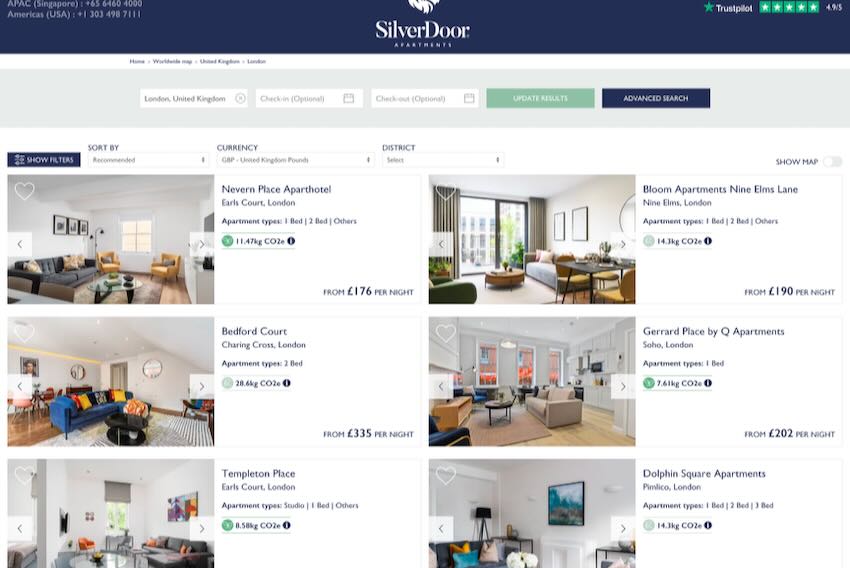
WORLDWIDE: SilverDoor, the global provider of serviced accommodation for business travellers, has today announced the launch of a new sustainability tool – a carbon calculator.
The tool will enable SilverDoor’s clients to “adopt a more forensic approach” when reviewing and understanding the environmental impact of the accommodation they choose.
Properties using the carbon calculator will input their emissions data and the technology will calculate the carbon for them. A property level calculation based on the information they put in, shows results per apartment type, whether it’s a studio, a one bed or two bed apartment, and so on. Once the calculation has been made a specialist team at Silverdoor can sense check it and look out for any errors or anomalies.
According to SilverDoor having access to this property data will help its clients set monitor and achieve their business travel sustainability goals. Given the arrival of the CSRD regulations in January the data will also be useful from a scope 3 perspective.
Alex Neale group head of partner relationships at SilverDoor said: “We’ve seen lots of sustainability requirements gain prominence in travel policy and in the RFPs we’ve been working on.”
At Sustainable Hotel News we regularly write about the Sustainable Hospitality Alliance and its Hotel Carbon Measurement Initiative (HCMI) carbon calculating tool, which is used widely across the hotel sector. The SilverDoor Carbon Calculator is the first tool of its kind to collate carbon emissions data just for the serviced apartment sector. Given the measurement of emissions involves collecting information from utility bills and applying those figures to the floor space used, why does the serviced apartment sector need a different carbon calculator from hotels?
Neale added that the Alliance’s tool has become something of a benchmark for the hotel space, “but our sector has a lot of different products from aparthotels to residential units” and SilverDoor has adapted the methodology to allow for those different accommodation types.
“The serviced apartment sector at a global level has a high volume of operators and that brings with it a high level of diversity in terms of the range of accommodation types and services available. Historically that has meant accurate estimates on carbon emissions has been a challenge.”
Neale further explained that the corporate housing sector also wants its own property estimates to benchmark against: “There is a long term ambition to capture the data and confidently capture industry averages specific to serviced apartments in the same way Cornell does with the hotel world, so we can then start comparing our property estimates with our own industry data.”
SilverDoor looked at the Sustainable Hospitality Alliance’s tool carefully and collaborated with them to share expertise of the serviced apartment industry. The company is keen to support the Alliance and engage in the community in developing resources to support the serviced apartment part of the industry as well.
The tool was developed after listening to clients and how they wanted to see more of this type of data and understand what was going on in their serviced apartment programme.
Using data provided by more than 2,000 properties SilverDoor’s proprietary methodology will estimate what CO2 emissions can be attributed to a night’s stay in an operator’s apartment. This will include total area of each apartment, as well as the wider building, electricity, gas and oil use, total area of climate-controlled space, water consumption and laundry management.
The free carbon calculator looks at a building-specific, per night CO2 emissions estimate for a stay in a serviced apartment and compares this figure to an equivalent hotel stay using data from the Cornell Hotel Sustainability Benchmarking Index. The information will help guests, travel managers and bookers compare the environmental performance between bookings, based on type and length of stay, in exactly the same way they compare rates, location and facilities.
Just like using a filter to show price, a client will be able to see a property’s CO2 emissions (see image above).
Hanish Vithal chief information and technology officer, SilverDoor said: “From a tech perspective it’s important for us to also have the tool in our technology so we have made it easier and seamless for our supply chain to be able to access this information quite quickly.“
SilverDoor’s Neale said: “Across the supply chain operators are being charged with researching and providing robust data sets that offer greater transparency and a deeper understanding of the carbon emissions of each business trip.
“Our ambition for the launch of the Carbon Calculator is to provide that data and transparency for the serviced apartment sector and lead the industry in the next stage of its sustainability journey.”
When asked if SilverDoor would look into more tools to help with sustainability accreditation, for example, Neale said that wasn’t currently in the running nd by offering a free tool like the carbon calculator, rather than asking properties to go through expensive accreditation processes, communicating the emissions part of sustainability makes it accessible to all levels and size of properties in SilverDoor’s portfolio.
“We didn’t want to isolate the smaller clients, we wanted to give them the same opportunity as our bigger ones,” Neale added.
“In launching the Carbon Calculator our focus is on using the scale of that reach and diversity to develop the most informative and accurate tool on the market. As more partners submit their data it will work alongside the data from Cornell so that together with our partners and our clients we can take the next, better informed steps towards a more sustainable future for travel together.”
Earlier this month certification, consulting and advisory group EarthCheck launched a freight, food and laundry carbon calculator to help tourism operators understand and manage their emissions.
EarthCheck launches carbon calculators for freight, laundry and food
Image: Supplied SilverDoor

